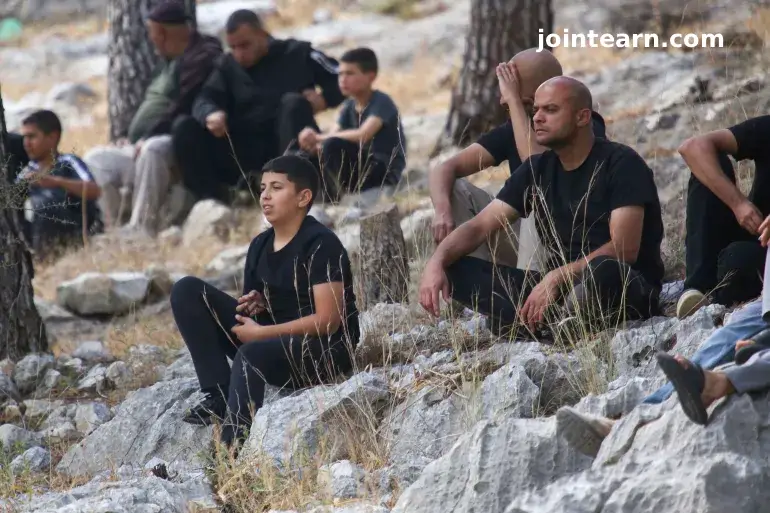
TULKAREM, Occupied West Bank – In the shadow of ongoing conflict, Palestinian residents near Tulkarem continue to face escalating violence as Israeli soldiers carry out widespread demolitions and forced displacements in the Nur Shams and Tulkarem refugee camps. Entire neighbourhoods now lie in ruins — homes flattened, vehicles abandoned, and once-bustling streets reduced to silence.
Over recent months, Israeli forces have intensified operations across the occupied West Bank, particularly around Tulkarem, where bulldozers, sniper fire, and reported acts of arson have left tens of thousands without shelter. According to the United Nations Relief and Works Agency (UNRWA), around 32,000 Palestinians from Tulkarem, Nur Shams, and Jenin refugee camps have been forced to flee since January 2025 under “Operation Iron Wall.”
The Israeli military has sealed off these camps, declaring them closed military zones. Any civilian attempting to re-enter risks being shot.
“We Just Want a Safe Life”
Among the few remaining families is that of Abdel*, who lives under constant surveillance. Israeli soldiers have occupied the area next to his home, frequently forcing him to perform unpaid labour — repairing their equipment and providing food, often at his own expense.
“We don’t want anything. Just a safe life,” Abdel says. He and his family rarely leave home, fearing harassment or worse. The soldiers’ threats are real; nearby houses have been burned or destroyed when residents refused to comply.
During a January raid, Abdel’s home was ransacked, his family expelled for ten days, and his possessions destroyed. Upon returning, soldiers warned him: “We won’t throw you out as long as you help us.” One reportedly told him, “I am your lord, you are here to serve me.”
Abdel estimates he spends about 1,500 shekels ($440) monthly meeting soldiers’ demands — a heavy burden for his already displaced family.
Homes Burned and Lives Erased
Abdel’s neighbour Nihad faced a similar ordeal. Israeli troops stormed his home at night, ordering his family out at gunpoint and occupying the building for more than two months. When he returned, his home was unrecognisable — furniture smashed, appliances destroyed, and children’s belongings scattered across the floors. Walls were marked with soldiers’ names and slogans, including “F*** Hamas,” scrawled in lipstick.
Such scenes have become common across Tulkarem and Nur Shams. Human rights organisations, including Adalah and Bimkom, report that hundreds of houses and key infrastructure like water and electricity systems have been destroyed. In July, Israel’s High Court briefly halted some demolitions but later permitted them to continue for “security reasons,” effectively granting the military wide discretion.
Arson and Demolitions on the Rise
Tulkarem’s Popular Committee says Israel is now demolishing homes at the fastest rate since 1967, aided by U.S.-manufactured bulldozers. Residents also report a sharp increase in arson. “Every day, they burn two or three houses,” says committee member Suleiman Suhairi. Some residents have resorted to removing gas stoves to prevent soldiers from using them to start fires.
According to researcher Ihab Maharmeh, these actions are part of a systematic policy: “Israel is transforming everyday Palestinian life into a form of warfare.”
Analyst Nur Arafeh adds that forcing Palestinians into unpaid labour and threatening them with expulsion reflects “a colonial mentality rooted in domination and dehumanisation.”
Despite repeated requests, Israeli authorities have not responded to questions regarding the allegations of arson and coerced labour.
Displacement and Desperation
Over 130 displaced Palestinians now shelter in a former government school above Nur Shams, sharing crowded rooms and minimal facilities. Families try to maintain a semblance of normal life, growing herbs in pots and hanging laundry on the walls, even as their former homes remain off-limits.
For many, returning home is too dangerous. One displaced resident, Mohamed Kamel, recounts being forced out at gunpoint during heavy rain, given only minutes to leave. His family walked for hours to safety, carrying his injured mother. When he later tried to recover his car, soldiers opened fire.
According to local reports, nearly 200 Palestinians have been killed by Israeli forces in the West Bank this year, most of them from Jenin and Tulkarem.
Abdel’s ordeal continues. After soldiers left his area briefly in August, he was soon arrested and detained for a month. While he was imprisoned, his family was expelled again.
“I was beaten badly,” he says. “Now I’m out, but we can’t go back home. We don’t know what comes next.”


Leave a Reply